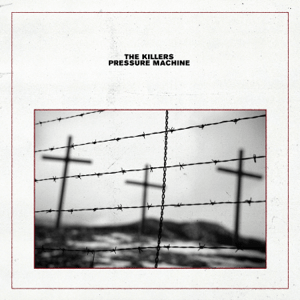The Killers reflect on small-town life in new album Pressure Machine

The Killers new album takes listeners back to the small town life the band grew up with.
August 27, 2021
Less than a year after releasing Imploding the Mirage, The Killers have returned once again to create their eighth studio album: Pressure Machine. While the album was originally supposed to contain unused songs from Imploding the Mirage, lead singer Brandon Flowers had a different idea for the record. Flowers wanted to make an album about his childhood in his hometown of Nephi, Utah. Thus, Pressure Machine was born.
The album as a whole evokes a very calm, melancholy feel. Like their previous few albums, Pressure Machine is quite distinct from the glamorous rock and synth-pop The Killers were once known for. The band seems to have channeled their inner Bruce Springsteen and is now determined to make heartland rock for the rest of their career. Additionally, almost every track begins with a brief clip of an interview with a Nephi resident that sets the tone of the rest of the song. Along with the general subject of life in rural America, the album closes in on specific significant topics ranging from addiction to homophobia, and each song tells a story based on Flowers’s childhood.
The album opens with a soft, peaceful ballad, “West Hills.” After a short interlude featuring a few Nephi residents, the song begins with a tranquil piano and the song’s narrator describes feeling at home in the nature surrounding his hometown. However, during the second verse, the story takes a sharp turn. The narrator recounts the local sheriff kicking his door in to arrest him for possessing “hillbilly heroin pills,” or opiates, contrasting with the song’s harmonious buildup. The next song, “Quiet Town,” discusses the opioid crisis’s effects on Nephi more explicitly during the verses by describing the funerals of drug overdose victims. During the chorus, though, the song’s theme changes. Contrary to how the verses show the dark side of the area, the chorus tries to build up Nephi as a pleasant, charming town, as though the song’s narrator is desperately trying to search for good things about their home.
The most somber song on the album, “Terrible Thing,” is a simple stripped-down song from the point of view of a gay teenager considering suicide. The narrator watches as spectators cheer at bullfighting during a rodeo. He questions how the same people who are revolted by him for something as simple as his sexuality can be entertained by such a brutal event. The track ends ambiguously, with the narrator recalling his baptism in a nearby creek. Most of the song’s lyrics are rather vague. The narrator never explicitly states he plans to kill himself, yet the song’s basic, melancholy tone makes the listener immediately understand what the narrator means when he says he’s “on the verge of a terrible thing.”
And as far as rural living goes, Pressure Machine has its share of characters anyone from a small town would be familiar with. The songs “Runaway Horses” and “In Another Life” both involve characters who settle down too young. Featuring rock musician Phoebe Bridgers, “Runaway Horses” details how a once passionate young woman gives up on her dreams and gets married as soon as she graduates high school rather than attending university. Meanwhile, “In Another Life” is from a man’s point of view. He questions how his life ended up the way it did, staying in his hometown and working at a local factory, and if it’s what he or his wife really wanted. All he can do now, though, is think about what could have been in another life.
The final two songs on the album, title track “Pressure Machine” and “The Getting By,” do a decent job of wrapping up the album. Both are songs about people who aren’t particularly content with their life, but they’re living. In particular, “The Getting By” displays this theme well. The name of the song itself describes the idea: The song’s narrator is far from happy, but he’s surviving, or getting by. However, while the last two tracks do a nice job of closing the album thematically, they’re also probably the weakest two songs on the album. Though the majority of the songs on Pressure Machine are of the slower variety, “The Getting By” is boring to listen to in comparison to the rest of the album. There’s nothing particularly special about it, and it drags on for five whole minutes. At the same time, Flowers is definitely capable of better lyricism than what he showed in the title track. He went from “wrapped up in the strangle silk of this cobweb town” in “Terrible Thing” to “she’ll cook my eggs in bacon grease” in “Pressure Machine.” Enough said. No one wants to listen to a great album only to sludge through the final songs.
As a whole, Pressure Machine is a solid album, though it’s not without its problems. The album contains several low-key songs that could become tiresome for some listeners, or just flat-out be too much of a downer. But to anyone into folk rock, nostalgic for Bruce Springsteen or wanting to take a breather and think for a bit, Pressure Machine is a great listen.








